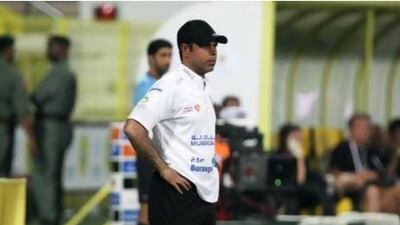For 15 minutes in July the UAE's footballers threatened to pull off one of the biggest shocks of the London Olympics.
Rashed Eisa had just equalised against Great Britain at Wembley and for those 15 brilliant minutes, the hosts could get nowhere near the young Emirati players.
Led by Omar Abdulrahman, the UAE Under 23 team toyed with the English Premier League stars and could have taken the lead several times. For Emirati football, it was the high point of 2012, and perhaps many a year.
Sadly, the missed opportunities proved costly, and Great Britain scored two late goals to win 3-1.
But the country's football chiefs had seen enough. The UAE may have only collected one point at the tournament, but the level of performances convinced them that Mahdi Ali was the right man to lead the country's senior national team.
It was a popular appointment all around. Here at last was promotion, and vindication, for an Emirati coach with the ideal combination of modern football methodology and genuine appreciation of what the job means.
This case of appointing from within was a welcome, if belated, indication that the country's football officials are willing to invest long term in Emirati coaching talent.
The players who had played under Mahdi Ali, for their part, could not have wished for a better choice than the man who had led them so well through qualifying, not to mention the excellent performances in London.
With the Olympic squad, Mahdi Ali had produced results where others had failed. His team also played an effective possession-based, short passing game that had proved beyond the capabilities of the senior team for years.
Seamless integration of this crop of younger players into the senior set-up would have been high on the list of priorities when he was appointed.
Following Abdullah Misfir's short reign Mahdi Ali becomes the second consecutive Emirati to land the job after years of seemingly endless foreign appointments, some more successful than others.
For every Bruno Metsu, who delivered the Gulf Cup in 2007, there have been farcical appointments such as Dick Advocaat, who enacted an escape clause in his contract only a month after landing in the UAE in 2005. Those days of short-termism, it is hoped, are now long gone.
Last week, the Football Association set Mahdi Ali the considerable task of reaching the 2015 Asian Cup in Australia and then the 2018 World Cup finals in Russia.
In theory, it is a remarkable show of faith, and not one that has been afforded to many previous coaches. Should he succeed in taking the UAE to the 2018 World Cup, Mahdi Ali would have been at the helm for six years. To put that in context, that is two years longer than any coach has managed in the history of the national team. Indeed, since 1997, no coach has lasted more than two years in the post.
But, ultimately, it is all about results. Before looking too far ahead, Mahdi Ali and his players must show consistent improvement if the project is allowed to run its course.
Next month's Gulf Cup in Bahrain is perhaps too early to form an opinion of the development of the current squad, and the coach himself said last week that he has not had enough time with his players.
Accordingly, should performances falter, surely no knee-jerk reactions are expected this time.
However, by the time the UAE kick off their Asian Cup qualifiers in February, Mahdi Ali will be expected to start delivering results.
Of course, if the FA is genuinely looking towards the 2018 World Cup from this early stage, then the country's youth set-ups, which have consistently produced talent over the years, must be given particular attention, and they have a chance to impress next year.
In June, the UAE will take part in the 2013 Fifa Under 20 World Cup in Turkey, while the Under 17 World Cup will be hosted across the seven emirates between October 17 and November 8. In many ways, certainly with a view to Russia 2018, performances in these two competitions will be as important as any by the senior side in the coming year.
But Mahdi Ali will know, that in the eyes of the public, it is the results of the first team that matter. In 2012, following the previous year's disappointing early exit from the 2014 World Cup qualifying campaign, interest in the national team is as low as it has been in many years.
It is Mahdi Ali's job to turn the tide, starting with Tuesday's friendly against Yemen.
Follow us

